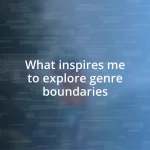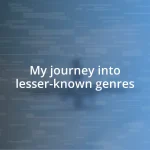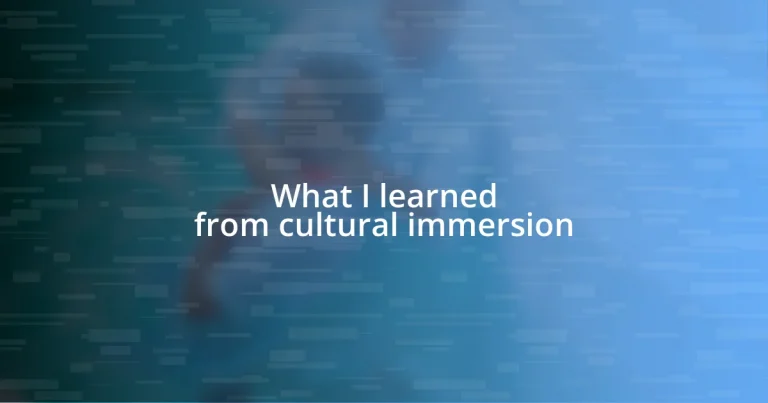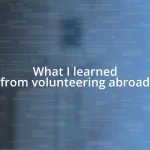Key takeaways:
- Cultural immersion fosters deep connections and empathy through shared experiences, such as meals and storytelling, revealing the universality of human emotions and aspirations.
- Navigating challenges like isolation and social nuances during immersion leads to personal growth and increased awareness of cultural complexities.
- Engaging in local activities, asking about personal experiences, and maintaining a reflective journal enhances the immersion experience, facilitating deeper understanding and personal development.
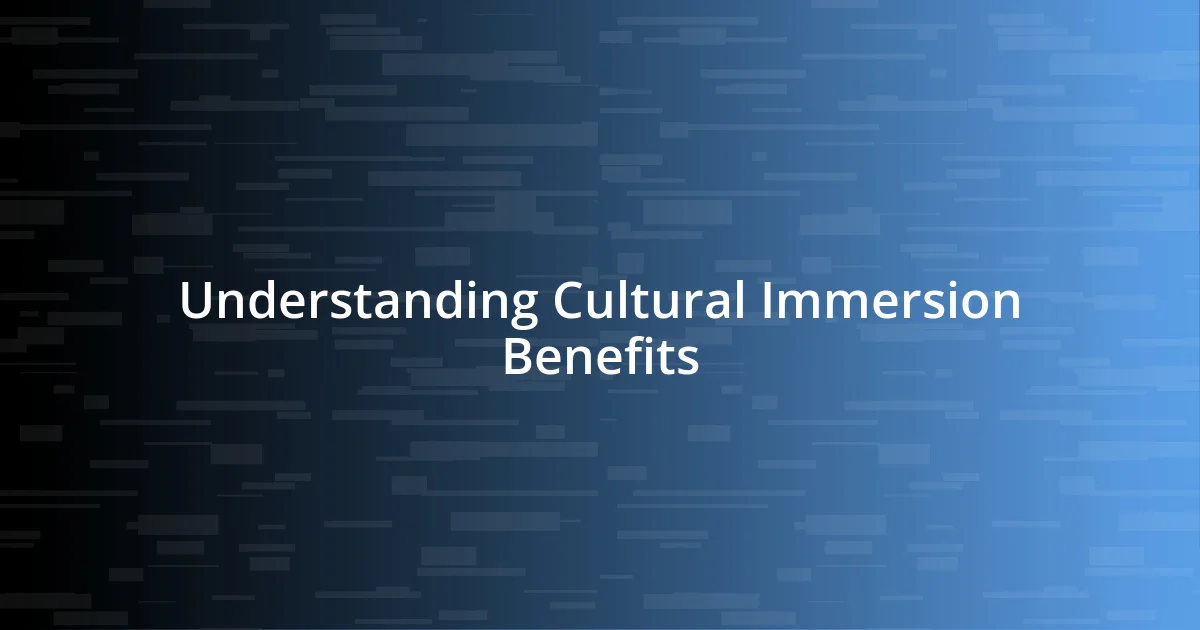
Understanding Cultural Immersion Benefits
Cultural immersion opens the door to authentic experiences that go beyond conventional travel. I remember sitting in a bustling market in Morocco, surrounded by vibrant colors and enticing aromas. It struck me how easily I connected with the locals through smiles and gestures, highlighting the beauty of shared human experiences. Isn’t it fascinating how a simple interaction can bridge gaps between us?
One of the most rewarding benefits of cultural immersion is the shift in perspective it brings. As I navigated through the ancient streets of Kyoto, I found myself overwhelmed by the deep respect the Japanese have for nature and tradition. This made me reevaluate my own habits and priorities. Have you ever found yourself changing your views after experiencing a different way of life?
Moreover, these experiences promote empathy by allowing us to step into someone else’s shoes. I recall joining a family for a homemade dinner in Mexico, where each dish came with stories of heritage and love. Listening to their tales opened my heart and mind, creating lasting memories that transformed my understanding of community and kinship. Could anything be more enriching than realizing how interconnected our lives truly are?
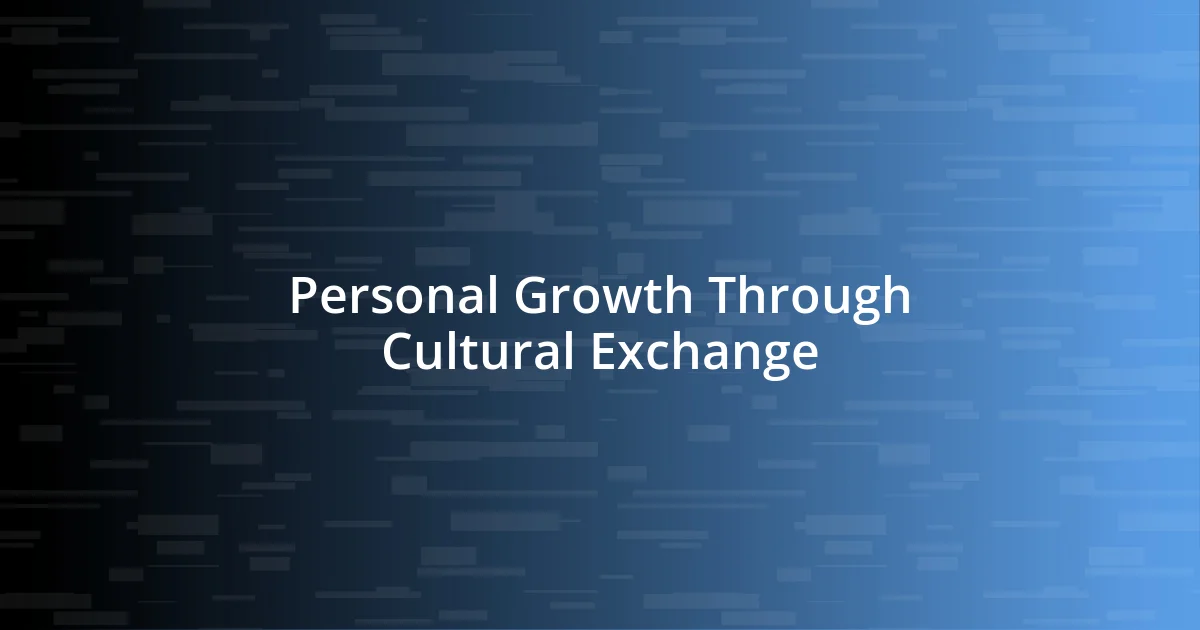
Personal Growth Through Cultural Exchange
Experiencing different cultures firsthand has profoundly shaped my personal growth. I’ll never forget participating in a traditional tea ceremony in China. I felt a deep sense of calm and mindfulness wash over me as I learned the significance behind each gesture. It wasn’t just about making tea; it was a meditative practice that deepened my understanding of patience and presence in my daily life.
Here are some ways cultural exchange can foster personal growth:
- Enhanced Empathy: Meeting people from diverse backgrounds has taught me to appreciate different perspectives and lifestyles.
- Resilience Development: Facing language barriers or unfamiliar customs challenged me to adapt and think creatively in real-time.
- Increased Open-Mindedness: Each experience encouraged me to question my assumptions and embrace new ideas, fostering personal evolution.
- Strengthened Communication Skills: Navigating conversations across cultures pushed me to become more mindful of non-verbal cues and tones.
- Deeper Self-Reflection: Observing contrasting values often prompted me to reconsider my own beliefs and priorities, leading to meaningful change in my life.
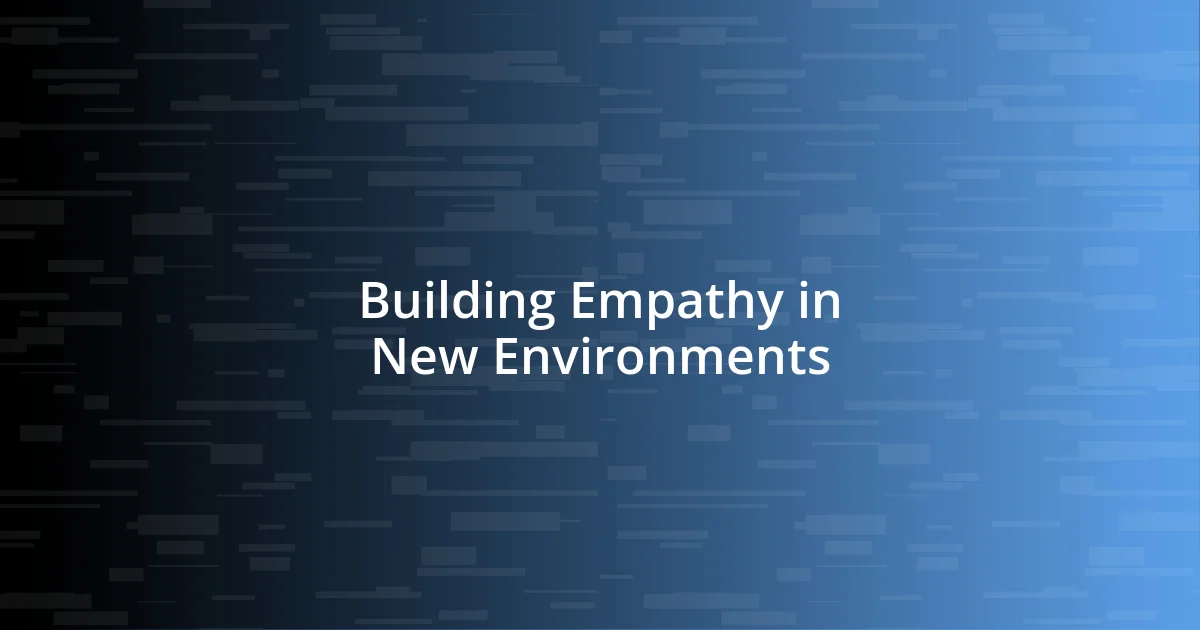
Building Empathy in New Environments
Building empathy in new environments is an invaluable aspect of cultural immersion. I remember my first encounter with a traditional dance performance in Ghana. As I watched the dancers move in sync with the pulsating drumbeats, I felt a profound connection to their joy and struggles. It wasn’t just a show; it was a window into their culture and emotions, compelling me to see the world through their eyes. Have you ever felt that powerful sense of belonging, even among strangers?
Every immersion experience offers a chance to cultivate empathy by engaging directly with different narratives. For example, during a stay in a remote village in India, I shared daily life with a family. Simple moments, like cooking together and storytelling by candlelight, revealed their hopes and dreams, turning my visit into a two-way exchange. It made me realize that despite our differences in customs and backgrounds, the underlying emotions and aspirations are often quite similar. Isn’t it striking how personal connections can dismantle preconceived notions?
Embracing new environments nurtures curiosity about the lives of others. I once joined a street art workshop in Berlin, where participants shared their backgrounds and motivations behind their art. Listening to their stories enriched my understanding of social issues they faced, deepening my compassion and desire to advocate for change. This kind of empathy doesn’t just enhance our cultural understanding; it empowers us to become better global citizens. Don’t you agree that these shared experiences can be transformative?
| Experience | Empathetic Outcome |
|---|---|
| Ghanaian Dance Performance | Connection to joy and struggles through movement |
| Living with an Indian Family | Understanding shared hopes through daily activities |
| Berlin Street Art Workshop | Empowerment through understanding social issues |
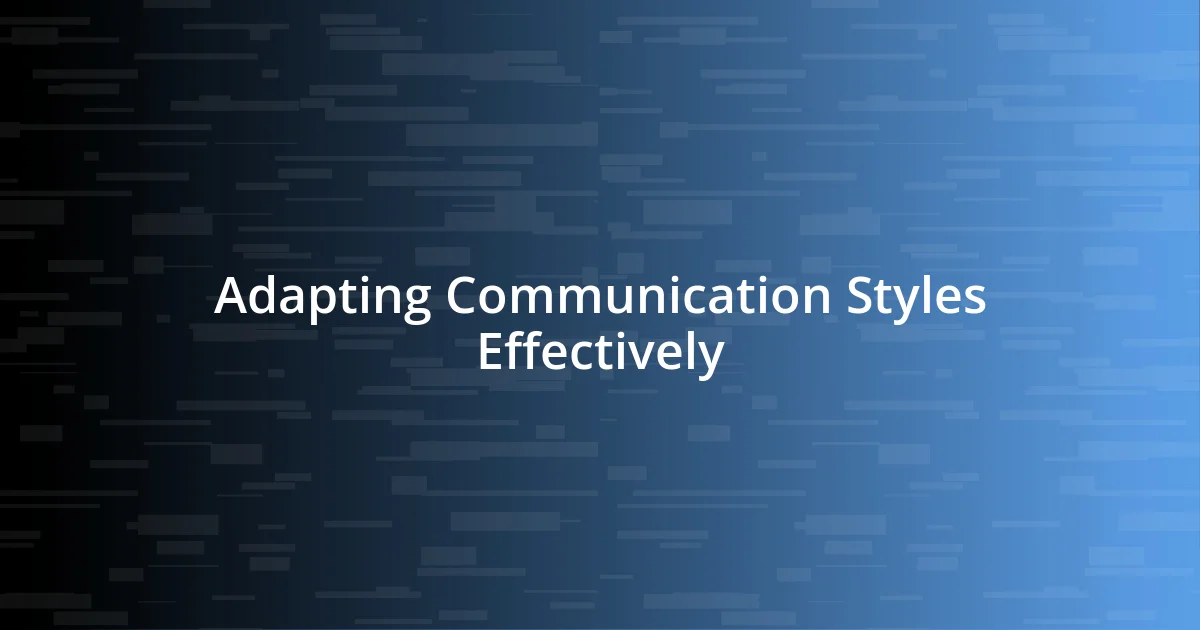
Adapting Communication Styles Effectively
Adapting my communication style while immersing myself in different cultures became essential for connecting meaningfully. I recall standing in a bustling market in Marrakech, where the vibrant energy enveloped me. I quickly learned that gestures often spoke louder than words. In conversations filled with laughter and animated hand movements, I found that adapting my body language made greetings and exchanges so much richer, transcending linguistic barriers. Have you ever realized the power of a smile in a foreign place?
In Italy, I encountered the beauty of expressive conversation. Italians are passionate and animated when they speak; their stories are often complemented by lively hand gestures and intonations. Initially, I felt out of my depth, but as I began to mirror their energy, the way we communicated transformed. I found myself engaging with locals at a café, sharing stories that flowed effortlessly, proving that emotion often carries more weight than the words themselves. Isn’t it fascinating how adapting to someone else’s style can forge connections that words alone might not create?
Reflecting on my time volunteering at a community center in Brazil, I discovered how vital active listening is. The feedback I received taught me to pause, acknowledge emotions, and give space for others to share their stories. By adapting my approach to be more reflective, I built trust and rapport with children and parents alike. It left me pondering: how often do we rush conversations, missing opportunities for deeper understanding?
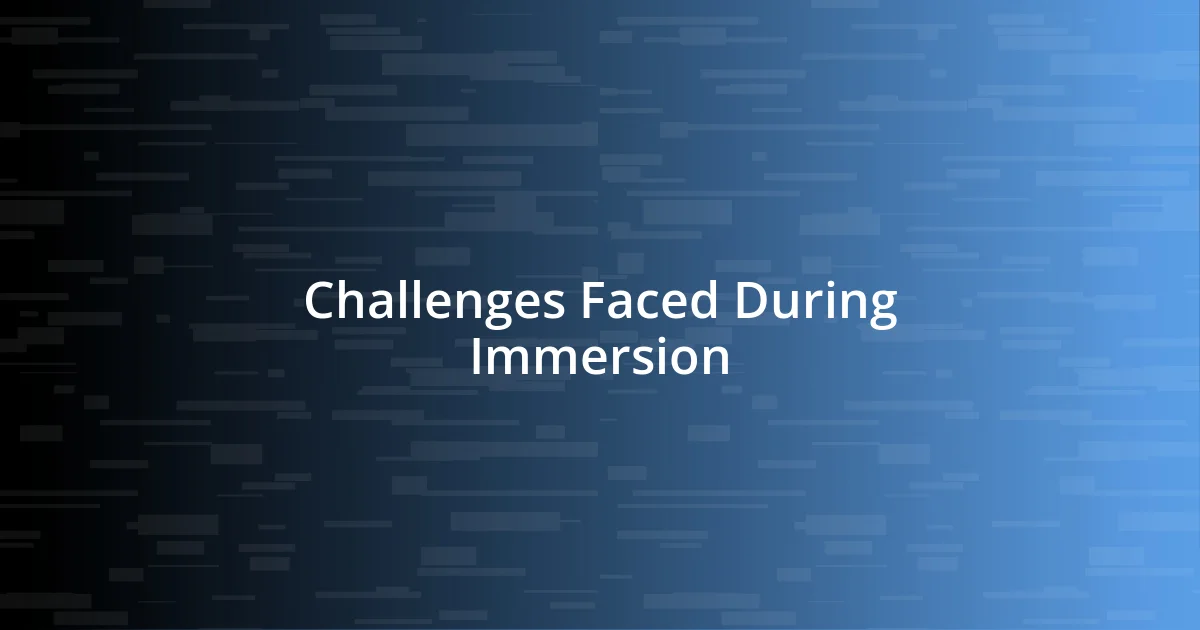
Challenges Faced During Immersion
Experiencing cultural immersion isn’t always smooth sailing. One challenge I faced was the overwhelming feeling of isolation during my initial days in a small town in Japan. Surrounded by unfamiliar faces and a language I struggled to grasp, I often felt lost. Ever been in a situation where the world around you feels like a captivating but inaccessible book? That’s how it felt for me, and navigating these moments forced me to confront my vulnerability.
Another hurdle was the pressure to adapt quickly. While living with a host family in Mexico, I sensed their expectation for me to embrace their customs without hesitation. I vividly remember a family gathering where everyone burst into joyous laughter, while I hesitated, unsure of the dynamics at play. The fear of making mistakes loomed over me, sparking anxiety. Have you ever faced the challenge of wanting to fit in but feeling like an outsider at the same time? It was uncomfortable, but it also led to growth and deeper understanding.
Additionally, understanding social nuances presented its own difficulties. During a festival in Thailand, I found myself inadvertently offending someone by missing a critical cultural cue. It was mortifying! I remember feeling a wave of embarrassment wash over me, but it taught me that cultural immersion involves learning from these missteps. How crucial is it to recognize that errors often become stepping stones to greater awareness? I realized that embracing these challenges as part of the journey could spark genuine connections and deeper insights into the culture around me.
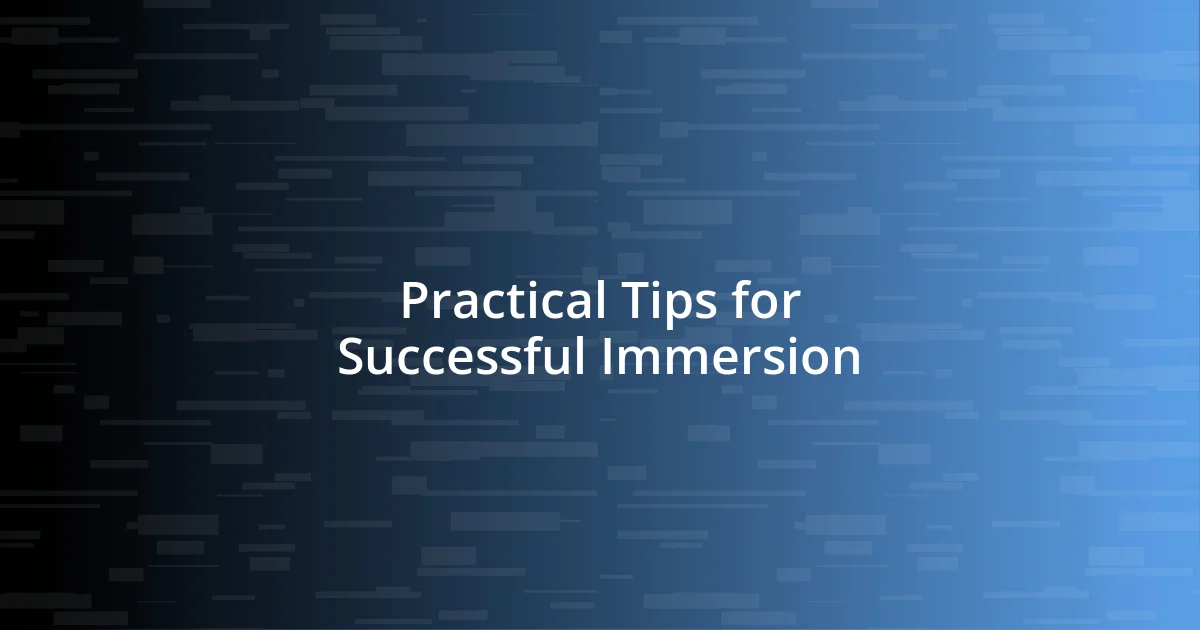
Practical Tips for Successful Immersion
One of the most effective tips I learned during my cultural immersion was to dive into local activities. When I joined a traditional dance class in Guatemala, I felt like a fish out of water at first. The energy of the group was infectious, and while I stumbled through steps, I absorbed the vibrancy of the culture around me. I couldn’t help but ask myself—how often do we resist stepping out of our comfort zones? Each awkward moment turned into laughter and connection, making me appreciate the culture at a deeper level.
Another practical tip is to make a point of asking local people about their experiences. In India, I often found myself striking up conversations at street food stalls, where vendors were eager to share their stories. One evening, a vendor’s tale about the origins of a dish I was sampling turned my meal into a memorable lesson. Reflecting on that experience, I realized that curiosity unlocks rich dialogues. Isn’t it amazing how personal stories can transform a simple meal into a journey through someone’s life?
Lastly, I discovered the impact of keeping a reflective journal. Each night, I would jot down thoughts after a day of exploration, recounting my encounters, feelings, and questions. It helped me process not just what I learned, but also how I felt—like forming a bridge between my experiences and understanding. Have you ever sat down to write and felt a rush of clarity wash over you? This practice allowed me to track my growth in real-time and reinforced the idea that immersion is as much about personal development as it is about cultural exchange.
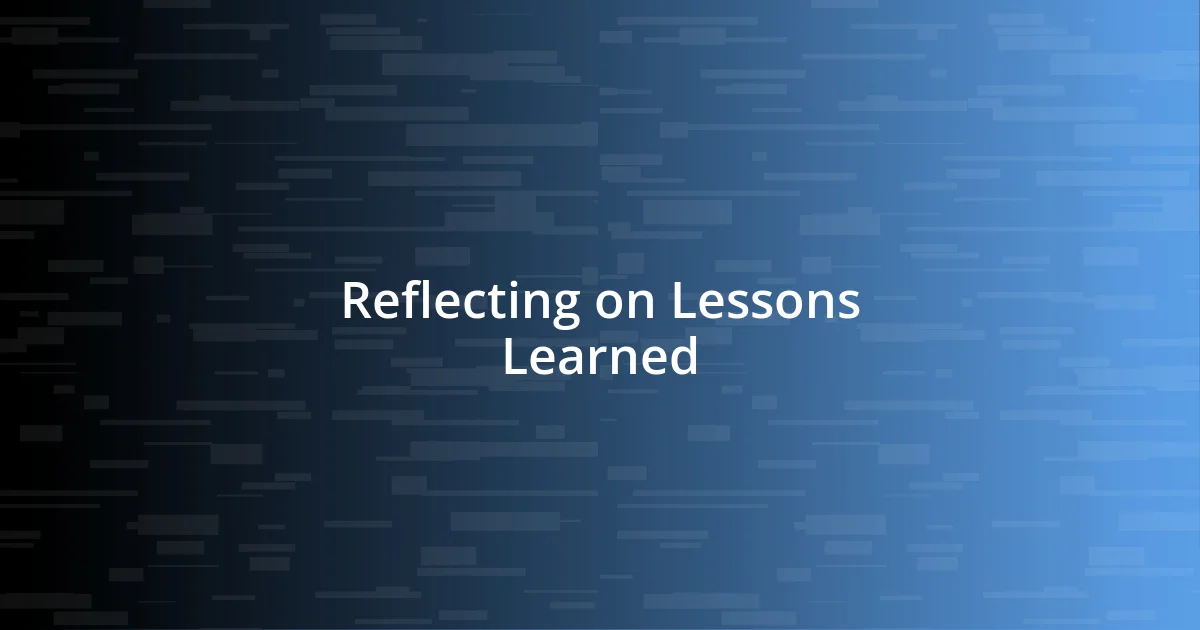
Reflecting on Lessons Learned
Reflecting on the lessons learned from cultural immersion, I found myself pondering the deep connections formed with the locals. One day, as I shared a meal with a family in Italy, I experienced an overwhelming warmth that transcended language barriers. Can you recall a moment when a shared meal turned into an unspoken bond? It was in those simple yet profound interactions that I truly grasped the essence of hospitality, learning that connection often blooms in the quiet exchange of stories and smiles.
Another important lesson emerged during my time in Morocco when I wandered through vibrant markets. I discovered that immersion isn’t just about understanding customs; it’s also about embracing differences. I vividly remember a moment when a vendor’s expressive gestures conveyed excitement for a product far beyond the language we shared. It made me reflect: how often do we overlook the beauty in unique ways of communication? I realized that clashing perspectives can lead to incredible insights, enriching my experience in ways I never anticipated.
Finally, I found that vulnerability is a vital component of growth. Initiating conversations could be nerve-wracking, especially in unfamiliar environments. One afternoon in Brazil, I mustered the courage to approach a local musician who invited me to join in an impromptu jam session. My heart raced, but the thrill of creating something beautiful together was unparalleled. Have you ever felt the exhilarating pulse of taking a risk? That experience taught me that stepping into vulnerability can reveal not just the culture around us, but also the layers within ourselves.




